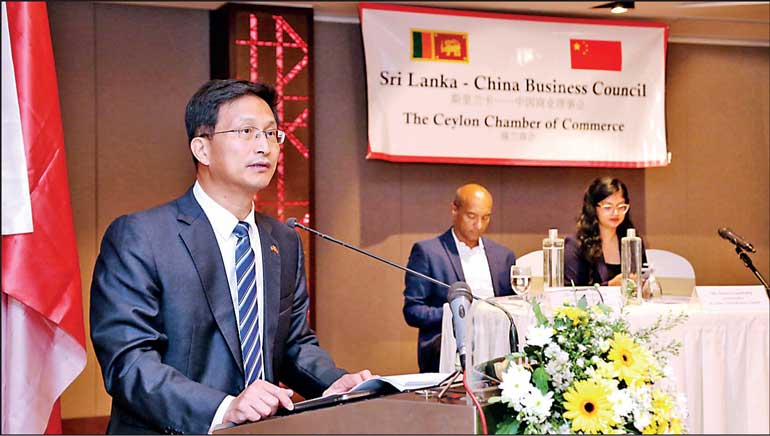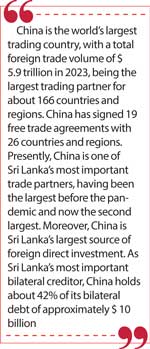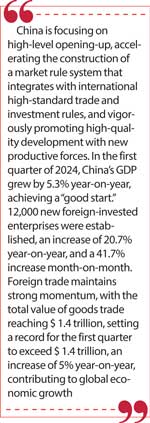Wednesday Mar 04, 2026
Wednesday Mar 04, 2026
Wednesday, 10 July 2024 00:00 - - {{hitsCtrl.values.hits}}

People’s Republic of China Ambassador Qi Zhenhong
 It is a great honour to be invited by the Sri Lanka-China Business Council of the Ceylon Chamber of Commerce to attend the 23rd Annual Meeting. First and foremost, on behalf of the Embassy of the People’s Republic of China in Sri Lanka, I extend my warmest congratulations to all members of the council! The Ceylon Chamber has a long history and has maintained a friendly and cooperative relationship with the Chinese Embassy. We highly appreciate the Chamber’s outstanding contributions to promoting exchanges and economic cooperation between our two countries.
It is a great honour to be invited by the Sri Lanka-China Business Council of the Ceylon Chamber of Commerce to attend the 23rd Annual Meeting. First and foremost, on behalf of the Embassy of the People’s Republic of China in Sri Lanka, I extend my warmest congratulations to all members of the council! The Ceylon Chamber has a long history and has maintained a friendly and cooperative relationship with the Chinese Embassy. We highly appreciate the Chamber’s outstanding contributions to promoting exchanges and economic cooperation between our two countries.
The traditional friendship between China and Sri Lanka has a long history. The two countries have always been good neighbours helping each other and good partners seeking development together. Even before establishing diplomatic relations, China and Sri Lanka, resisted external pressures, signed the Rubber-Rice Pact, embodying the spirit of “independence, self-reliance, mutual assistance.” Since establishing diplomatic relations in 1957, mutual respect and support have deepened bilateral relations. In 2014, Sri Lanka took the lead in responding positively to President Xi Jinping’s Belt and Road Initiative, further enhancing pragmatic cooperation in various fields between China and Sri Lanka.
Currently, China is the world’s largest trading country, with a total foreign trade volume of $ 5.9 trillion in 2023, being the largest trading partner for about 166 countries and regions. China has signed 19 free trade agreements with 26 countries and regions. Presently, China is one of Sri Lanka’s most important trade partners, having been the largest before the pandemic and now the second largest. According to Sri Lankan statistics, the bilateral trade volume between China and Sri Lanka reached $ 3.3 billion in 2023, accounting for 11.9% of Sri Lanka’s total foreign trade. Sri Lankan products such as tea, gemstones, seafood and apparel are highly favoured by Chinese consumers. Moreover, Sri Lanka has rich marine fishery resources, abundant rubber and spices, and mineral resources such as titanium and zircon, presenting vast potential and promising prospects for trade cooperation between China and Sri Lanka.
China is Sri Lanka’s largest source of foreign direct investment
Investment cooperation projects such as the Colombo Port City, the Hambantota Port Comprehensive Development Project, and the Colombo International Container Terminal have injected vitality into local economic development, increased tax revenues and promoted local employment. Transportation projects supported by Chinese government loans, such as the Southern Expressway Extension and the Southern Railway, have been completed and put into operation, greatly alleviating transportation pressures along the routes.
The Polonnaruwa National Nephrology Specialised Hospital, built with Chinese grant, is the largest kidney disease specialty hospital in South Asia. The Outpatient Building of the National Hospital is the largest Chinese-donated project in Sri Lanka since the establishment of diplomatic relations and can be regarded as the “Bandaranaike International Conference Hall” of the new era.
Together with projects like the Kandy Water Technology Research and Demonstration Centre, these projects have significantly improved local medical conditions and residents’ quality of life. Additionally, about 70% of Sri Lankans have received COVID-19 vaccines donated by China in special urgent situations, and 80% of Sri Lankan primary and secondary school students’ uniform fabrics are granted by the Chinese government. During Sri Lanka’s most difficult times, the Chinese government provided emergency humanitarian aid such as rice, medicines, and fuel to help the Sri Lankan people overcome difficulties.
China’s support and assistance to Sri Lanka are evident. As Sri Lanka’s most important bilateral creditor, China holds about 42% of its bilateral debt of approximately $ 10 billion. On 26 June, an agreement on debt restructuring was reached between China and Sri Lanka, fully reflecting China’s firm support for Sri Lanka.
Moreover, during Sri Lanka’s most challenging economic period, Sinopec steadfastly made the decision to invest in the Sri Lankan market. They plan to invest in constructing 200 petrol stations and are about to invest $ 3.2 billion in building an oil refinery. Additionally, BYD, a renowned Chinese new energy vehicle brand, has signed an electric vehicle cooperation agreement with John Keells Holdings. Hayleys PLC is also actively exploring cooperation opportunities with China’s Chery Automobile. Today, a delegation led by the Deputy Director-General of the General Administration of Customs of China arrived in Sri Lanka for discussions on issues such as Sri Lankan agricultural products’ access to the Chinese market.
China into the future
 Currently, China is focusing on high-level opening-up, accelerating the construction of a market rule system that integrates with international high-standard trade and investment rules, and vigorously promoting high-quality development with new productive forces. In the first quarter of 2024, China’s GDP grew by 5.3% year-on-year, achieving a “good start.” 12,000 new foreign-invested enterprises were established, an increase of 20.7% year-on-year, and a 41.7% increase month-on-month. Foreign trade maintains strong momentum, with the total value of goods trade reaching $ 1.4 trillion, setting a record for the first quarter to exceed $ 1.4 trillion, an increase of 5% year-on-year, contributing to global economic growth.
Currently, China is focusing on high-level opening-up, accelerating the construction of a market rule system that integrates with international high-standard trade and investment rules, and vigorously promoting high-quality development with new productive forces. In the first quarter of 2024, China’s GDP grew by 5.3% year-on-year, achieving a “good start.” 12,000 new foreign-invested enterprises were established, an increase of 20.7% year-on-year, and a 41.7% increase month-on-month. Foreign trade maintains strong momentum, with the total value of goods trade reaching $ 1.4 trillion, setting a record for the first quarter to exceed $ 1.4 trillion, an increase of 5% year-on-year, contributing to global economic growth.
Meanwhile, China’s digital transformation and green transformation are accelerating. Next-generation digital technologies such as mobile internet, cloud computing, and artificial intelligence are increasingly widely applied. Currently, China’s 5G base stations account for over 60% of the global total, making it the world’s largest builder and operator of 5G networks. Cloud computing is also widely used in multiple fields. China leads globally in the application of artificial intelligence technology, holding 36% of the world’s large AI models.
In terms of green transformation, China speeds up in the application of wind energy, solar energy, and electric vehicles. The installed capacity of renewable energy has reached 1.585 billion kilowatts, accounting for 40% of the global total renewable energy installed capacity, with wind and solar energy capacities each accounting for over 40% of the global total. Four out of the world’s top five wind turbine manufacturers and six out of the top ten electric vehicle battery manufacturers are Chinese companies. China has led global photovoltaic component production for 16 consecutive years, supplying 70% of the world’s photovoltaic components and 60% of wind power equipment. The penetration rate of the electric vehicle market has reached 39.5%, ranking first in the world.
These achievements not only provide strong momentum for China’s own development but also contribute Chinese strength to addressing climate change and global sustainable development. We sincerely hope that Sri Lanka can ride on the fast train of China’s economic development and share the dividends of China’s economic growth. There should be no hesitation in advancing the China-Sri Lanka Free Trade Agreement negotiations. Cambodia, as the least developed country, signed a free trade agreement with China in 2020 and has greatly benefited from it.
China welcomes Sri Lankan enterprises to sell competitive and distinctive products to the Chinese market and actively participate in important exhibitions such as the CIIE, Canton Fair, and China-South Asia Expo in collaboration with Chinese enterprises for deep market development. We are pleased to see more and more Sri Lankan entrepreneurs paying attention to the Chinese market. Last year, only over 80 Sri Lankan entrepreneurs participated in the China-South Asia Expo, and this year, more than 200 entrepreneurs have registered to exhibit.
Development of “Global South” countries
Recently, at the commemoration of the 70th anniversary of the Five Principles of Peaceful Coexistence, President Xi Jinping announced several policies and measures to support the development of “Global South” countries. These include continuing to make good use of the China-UN Peace and Development Fund, the Global Development and South-South Cooperation Fund, and the South-South Cooperation Fund on Climate Change to support the economic development of “Global South” countries. China will also increase donations equivalent to $10 million to support agricultural development in “Global South” countries. We are willing to negotiate free trade agreements with more “Global South” countries, and from now until 2030, China’s cumulative imports from developing countries are expected to exceed $8 trillion. This will provide rare opportunities for capacity enhancement and deepening cooperation for many countries, including Sri Lanka.
Looking ahead, we can responsibly say that the more China develops, the more the world prospers. The prospects for China-Sri Lanka cooperation are broad, and we sincerely hope that entrepreneurs of the Sri Lanka-China Business Council can play a bridge role, becoming important promoters of mutual beneficial development and common prosperity between China and Sri Lanka. I am confident in the prospects of China-Sri Lanka economic and trade cooperation and will continue to provide new impetus for deepening the traditional friendship between China and Sri Lanka.